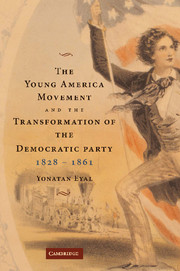Book contents
- Frontmatter
- Contents
- Acknowledgments
- Introduction: The Spirit of Young America
- 1 Orthodox Jacksonianism, 1828–1844
- 2 Trade and Improvements: The Economic Orientation of Young America Democrats
- 3 Rails, Canals, and a New Commercial Spirit
- 4 Young America Democrats and the Revolutions of 1848
- 5 A New International Consciousness
- 6 The Fires of Perfection Revisited
- 7 The Antislavery Democracy
- 8 New Democrats and the Coming of the Civil War
- Conclusion: Lincoln on Young America
- Index
7 - The Antislavery Democracy
Published online by Cambridge University Press: 31 July 2009
- Frontmatter
- Contents
- Acknowledgments
- Introduction: The Spirit of Young America
- 1 Orthodox Jacksonianism, 1828–1844
- 2 Trade and Improvements: The Economic Orientation of Young America Democrats
- 3 Rails, Canals, and a New Commercial Spirit
- 4 Young America Democrats and the Revolutions of 1848
- 5 A New International Consciousness
- 6 The Fires of Perfection Revisited
- 7 The Antislavery Democracy
- 8 New Democrats and the Coming of the Civil War
- Conclusion: Lincoln on Young America
- Index
Summary
Arthur and Lewis Tappan grew up in Northampton, Massachusetts, surrounded by the trappings of evangelical Christianity. Their mother infused orthodox piety into their youth, and by the time the brothers reached maturity, religious devotion dominated their lives. Lewis temporarily converted to Unitarianism, though he ultimately repented and joined his brother Arthur as a merchant in New York. Successful in their business, the two Tappans invested their earnings in philanthropic crusades ranging from Sabbatarianism to temperance to colonization. By the mid 1830s, they had become firm believers in William Lloyd Garrison's brand of immediatist abolitionism. Straddling the workaday world of New York commerce and the reformist mindset of evangelical perfectibility, the Tappans opened their pockets to a wide variety of Romantic causes. American historians routinely emphasize their importance in the abolitionist struggle before the Civil War.
Arthur and Lewis had a brother, one equally committed to ending black bondage but relatively neglected by scholars of abolitionism. Benjamin Tappan moved to Ohio, joined the Democracy, and embraced a radical style of antibank agrarianism during the 1830s. Eschewing his family's church, Benjamin put his faith in hard-headed political reform. The floors of legislature and courtroom were his chapels, bills and injunctions his weapons against sin. Among many causes, Benjamin Tappan began to labor for antislavery. Like his brothers Arthur and Lewis, Benjamin considered the southern institution immoral and worked steadily to eradicate it. Unlike his siblings, however, he deplored the weepy, sentimental, religious reformism that animated so many abolitionists.
- Type
- Chapter
- Information
- The Young America Movement and the Transformation of the Democratic Party, 1828–1861 , pp. 183 - 201Publisher: Cambridge University PressPrint publication year: 2007



